- Latest SEO trends in 2026
- Will all these SEO trends gonna drag your traffic down?
- Stay ahead and follow the latest SEO trends
Trends in the SEO industry are like running a race that never stops. Just when you think you’re ahead, search engines roll out algorithm changes, new strategies come into play, and you have to keep adapting to stay on top.
Whether you’re a digital marketer refining your strategies or an SEO content creator boosting your blog’s ranking, the rules of SEO apply to everyone.
Business owners aiming to increase online revenue also follow the same rules. Even SEO experts tracking algorithm updates are in the same race. The interesting part is, these rules are always evolving.
From UX designers and developers improving user experience to entrepreneurs wanting their products or services to rank higher in search results, staying up to date with the latest trends in SEO is essential. With new updates like voice search optimization, AI overviews, link-building techniques, and evolving website requirements, it’s important to be aware of these latest SEO trends.
In this blog, I’m going to explain the top SEO trends for 2026 that you can use to make your website stand out in the competitive crowd of search engines.
Latest SEO trends in 2026
As SEO becomes more crowded and competitive, it’s getting tougher for you to stand out. However, as people and technology get smarter, search engines like Google are evolving too. They are using AI and smarter tools to understand exactly what users are looking for.
This means you need to adjust your SEO strategies by adapting the latest SEO trends. The information about these trends in SEO will help you optimize your site for direct visitors and improve your website’s ranking. Let’s get started.
AI and technology-driven SEO
In this section, the focus is on how AI and technology are changing SEO strategies. Businesses are using AI-driven tools to improve their online visibility. Advanced algorithms and machine learning are reshaping how SEO works and making the user experience better.
Let’s look at the important roles of AI and technology in optimizing search engine strategies.
AI-powered SEO
AI-powered SEO means using AI tools to improve your website’s visibility in search results. These tools can analyze large amounts of data to understand what people are searching for and what they want. By using these SEO tools, you can save time and speed up essential SEO tasks, such as:
- Generating SEO content ideas like blog posts and how-to guides for your site is becoming more easier with these AI-powered SEO tools
- Preparing outlines for those blog ideas
- Creating XML sitemaps (a file that provides search engines with a roadmap of all the important pages on your website) and robots.txt files (a text file that tells search engines which pages or sections of a website should not be crawled)
These AI tools can help you get your work done faster.
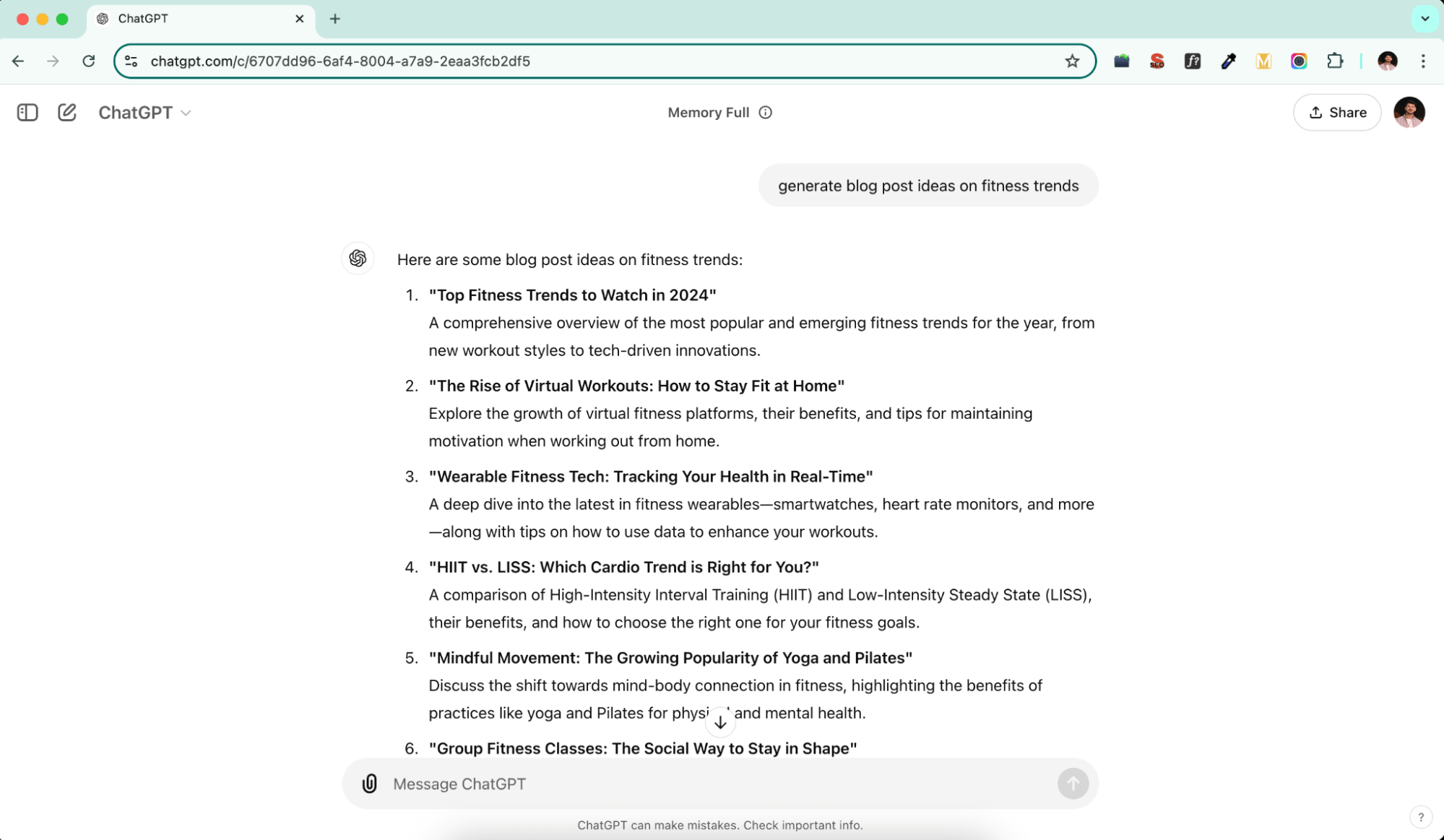
For example, an AI tool like ChatGPT can suggest blog topics based on your keywords. As you can see in the above image, I asked ChatGPT to give me blog ideas for “fitness trends,” and based on that, it generated relevant ideas like:
- Top Fitness Trends to Watch in 2026
- Wearable Fitness Tech: Tracking Your Health in Real-Time
- And more
These suggestions are customized to current fitness trends and keywords, making it easier for you to create content that aligns with what your audience is searching for. By using AI-generated ideas like these, you can save time and ensure your content is both relevant and optimized for search engines.
AIO (AI optimization)
AIO, or AI Optimization, is the process of using AI to improve websites for both users and search engines. It involves optimizing content to meet search engine quality standards and enhancing the user experience by making content more engaging and easier to read.
AIO tools can predict trends, helping you stay ahead of the competition by adapting to the latest SEO and content marketing strategies based on changing user preferences and search behaviors.
With AIO, you can:
- Generate high-quality content ideas based on trending keywords and popular search queries.
- Analyze user behavior to optimize content and layout, ensuring visitors stay longer on your site.
- Automatically optimize on-page SEO elements like meta tags, headers, and keyword density.
- Personalize content for individual users or segments of your audience, improving relevance and engagement.
- Track and predict trends to stay ahead of competitors by adjusting your content strategy in real-time.
- Improve website speed and performance by analyzing site structure and suggesting improvements.
For example, below is a screenshot from Surfer SEO showing its content optimization interface:

Using AIO tools like Surfer SEO you can ensure that your content is relevant and optimized for search engines and users alike, leading to higher rankings, more traffic, and improved user experience.
Google AI overviews
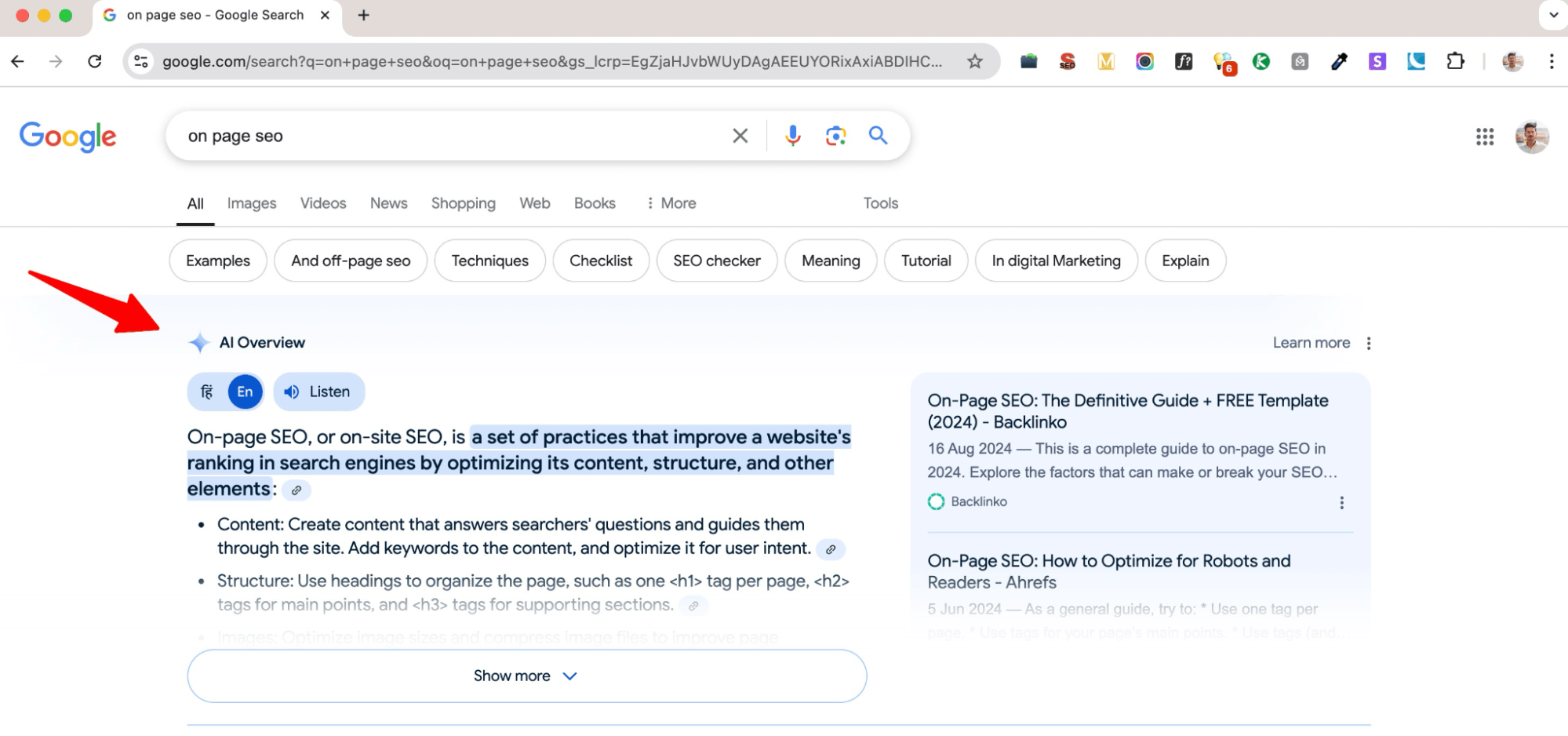
If you’re claiming to be an SEO professional and are not aware of this trend, then, my friend, you’re falling behind in the SEO race.
Google has been using AI for over a decade, and with the rise of generative AI, it’s adding this technology to more products. In 2023, Google started experimenting with AI in search, calling it Search Generative Experiences (SGE).
By May 2024, Google renamed this feature AI Overviews (AIO), which is now available for logged-in users in the US, and some other countries as well. These AI Overviews are summaries that pop up at the top of your search results, helping you find what you need faster. They’re created using Google’s AI model called Gemini.
AI Overviews include short paragraphs, lists, images, and product carousels, all generated by AI to summarize and add context to search results. These Overviews show up right below paid ads but above regular search results. If you want more details, you can click “Show More” to see a deeper explanation and check out the sources Google used.
For example, if I search for “ZeroAdo website pop-up examples,” the first thing that might appear is an AI Overview.
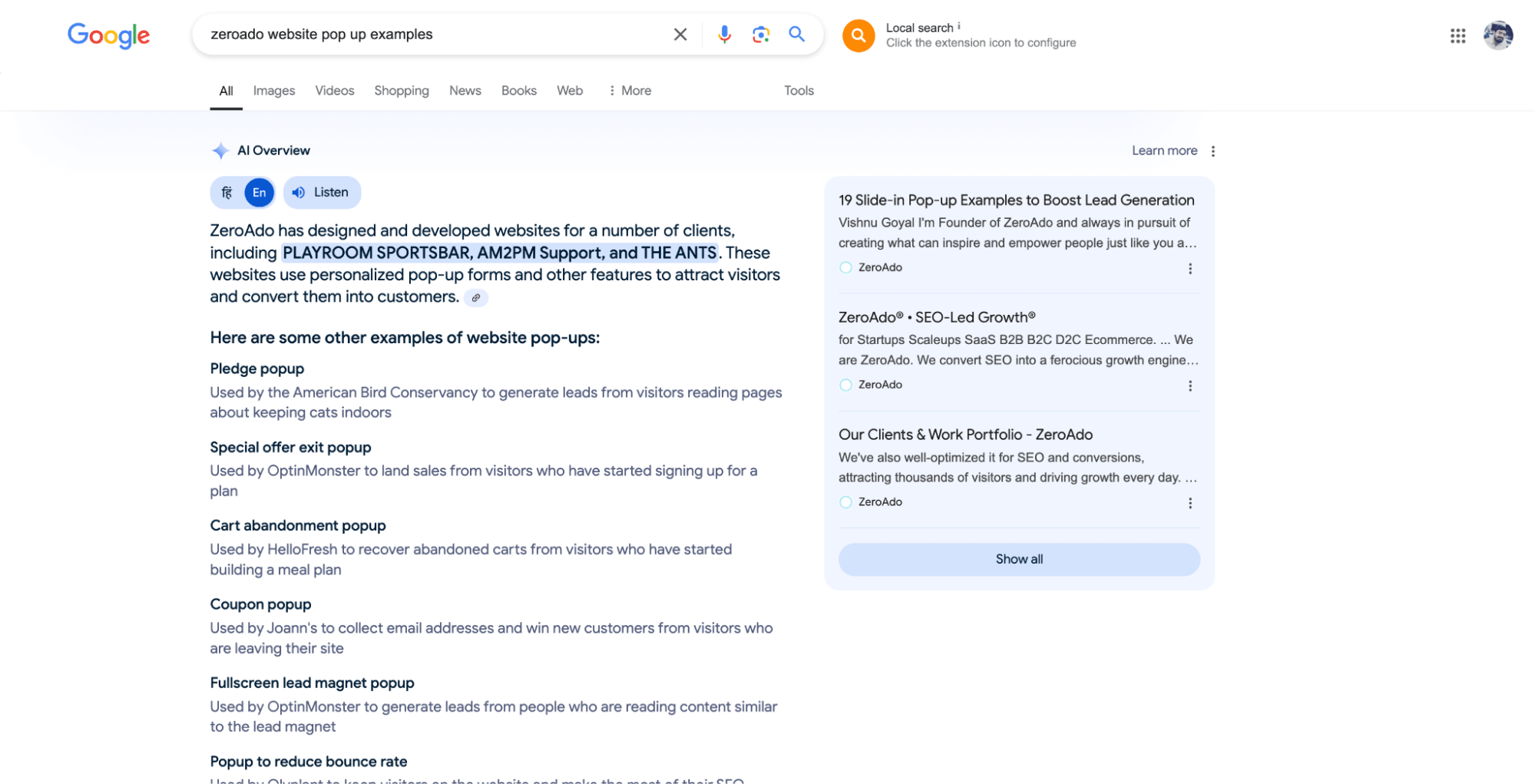
Right now, AI Overviews mostly show up for informational searches, like when you’re asking questions or looking for facts, as shown in the images above. However, they’re less common for transactional searches, like when you’re looking for services, booking a hotel, or ordering food.
For example, if I search for “best link building service providers,” the AI Overview disappears because it’s a transactional query, focused on services rather than providing information or answering questions.
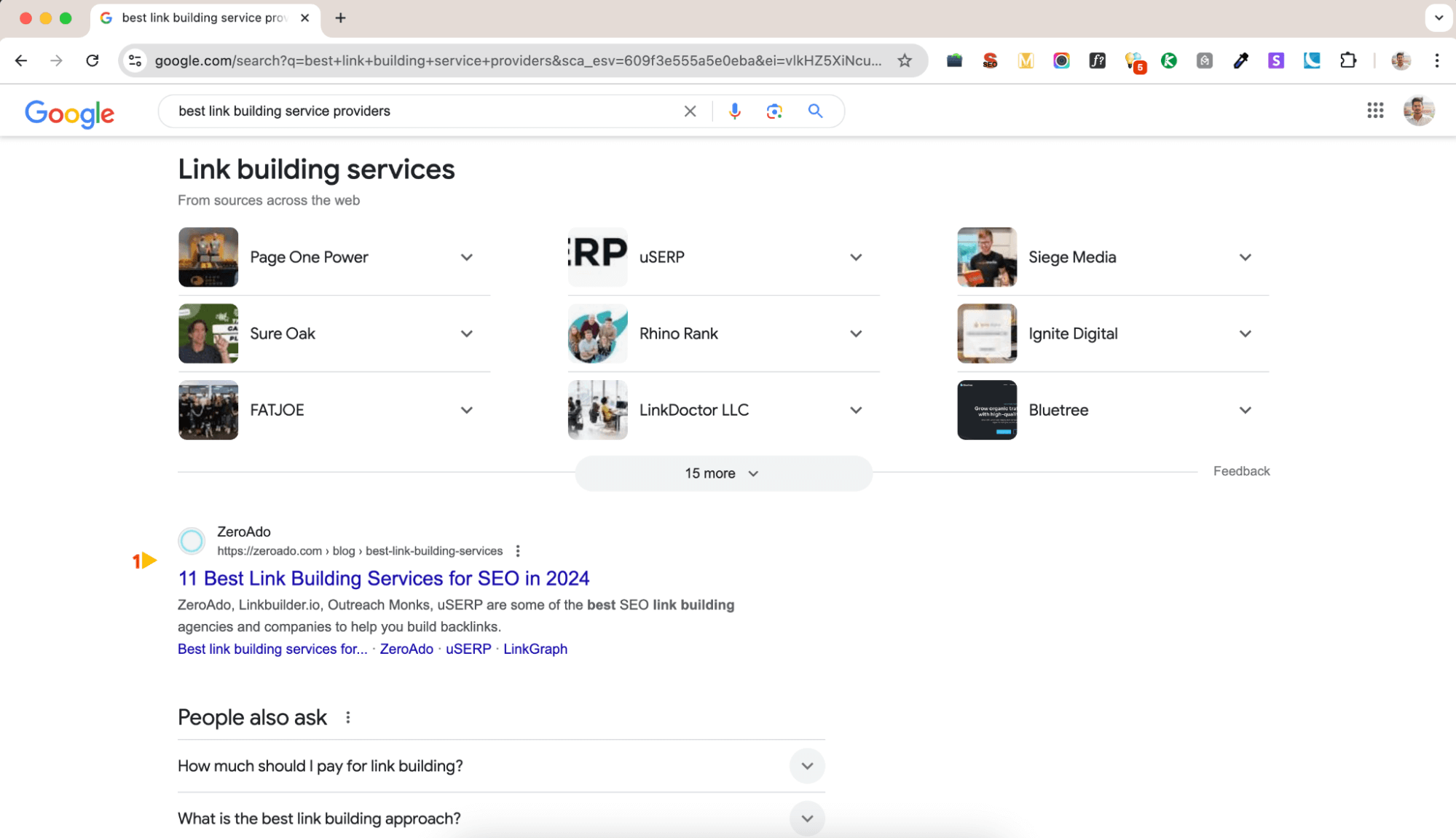
One interesting fact about AI Overviews is that 66% of the time, the websites featured in AI Overviews don’t rank in traditional search results. That’s because AI Overviews are designed to predict what your next question might be and show new, relevant info.
For you, this means creating high-quality content that answers potential follow-up questions can help you get featured in AI Overviews, even if your website doesn’t rank high in regular search results.
In short, AI Overviews are changing how Google shows search results, so you’ll need to tweak your SEO strategy to stay visible as these new SEO trends continue to evolve.
Search generative experience (SGE)
Google’s Search Generative Experience (SGE), now called AI Overviews, is a new version of Google’s search that uses AI to give more precise answers to complex questions. The SGE comes with several features designed to enhance user experience and deliver more accurate results.
Here’s a quick rundown of the features of SGE
- AI snapshot: It generates a quick summary by pulling information from multiple sources, perfect for answering longer, multi-part questions.
- Conversational mode: This lets you ask follow-up questions while remembering the context of what you previously searched for, keeping the responses relevant.
- Vertical experiences: When you search for products or local businesses, it provides detailed info like reviews, prices, and where to buy them.
- Context retention: It remembers your earlier queries, so your follow-up searches can be more personalized and accurate.
- Ad integration: Ads are still present, but they blend in with the AI-generated results and appear at the top of SGE.
- Transparency and trust: SGE shows the sources of the information it uses, which helps build trust by letting you see where the facts come from.
I genuinely believe that Google’s Search Generative Experience (SGE), now called AI Overviews, could significantly change how people search and how we approach SEO. However, I feel deeply disheartened by the way SGE impacts traffic for informational content.
Do not get offended if you’re a fan of Google, but it’s frustrating to see the company taking advantage of content creators and media companies by using their work without giving anything back. This started with “featured snippets” and has now become even bigger with AI Overviews.
Because of this, many media businesses, bloggers, and content creators are losing a lot of money, and some are even going out of business. It’s shocking that traffic on content and news sites has slashed by 20% to 60%.
And how much has Google paid these creators for using their content in AI Overviews? Absolutely nothing. Google has not paid a single cent for the content it displays, leaving many in the industry feeling robbed and unheard.
If this keeps happening, we might lose important voices in news and content creation. It’s really important for us to speak up for fair practices that recognize and reward the hard work of creators. If things don’t change, the world of online content could become worse, with original work losing its value and creators pushed aside.
Core algorithm and ranking factors
Search engines like Google constantly update their algorithms to ensure the most relevant and helpful results appear at the top of search results pages (SERPs). While the exact details of these algorithms are kept confidential, we can identify key ranking factors that influence a website’s position:
- Quality content: You need to create high-quality, informative, and engaging content that meets user needs.
- Keyword relevance: Use relevant keywords appropriately throughout your content. This helps search engines understand the topic and improves your chances of ranking higher.
- Technical SEO: Properly implement technical aspects, including sitemaps, robots.txt, and structured data. This is essential for search engines to crawl and index your website efficiently.
- Backlinks: Aim to acquire high-quality backlinks from reputable websites. These links signal to search engines that your content is valuable and trustworthy.
- Mobile-first indexing: Keep in mind that Google primarily indexes websites based on their mobile version. This emphasizes the importance of having a mobile-friendly design.
- Local SEO: If you aim to target a local audience, focus on optimizing your Google My Business listing, building local backlinks and citations, and encouraging reviews.
EEAT (Experience, Expertise, Authority, Trust)

EEAT is a framework used by Google to evaluate the quality of content. It stands for Experience, Expertise, Authority, and Trust. Understanding and implementing EEAT can significantly influence SEO performance. Let’s break down EEAT to get a better understanding.
Experience
Your content should reflect your real-life experiences. For example, if you have a travel blog, your insights from visiting places will likely rank better than generic content. This emphasizes the importance of sharing personal knowledge and practical insights.
Expertise
Make sure your content is created by individuals with recognized expertise in the topic area. For instance, a medical article should be written by a qualified healthcare professional. Demonstrating knowledge through credentials, qualifications, and thorough research helps establish your expertise.
Authority
Strive for your website to be viewed as an authority in its niche. You can achieve this by consistently publishing high-quality content, receiving backlinks from reputable sites, and building a strong online presence. Google assesses authority based on the reputation of your site and its authors.
Trust
Building trustworthiness is crucial for your SEO. Ensure transparency, provide accurate information, and protect user data. Positive user reviews, secure connections (HTTPS), and clear contact information all contribute to building trust.
HCU (Helpful Content Update) best practices
Helpful Content Update (HCU) was officially launched by Google in April 2022. This update was designed to reward high-quality content that helps users and demote low-quality or misleading content that is primarily created for search engine rankings.
Some best practices for aligning your content with HCU
- Focus on the audience: Create content that addresses the specific needs, questions, and interests of your target audience. Conduct audience research to understand their pain points and preferences.
- Provide value: Ensure your content offers real value, whether through detailed explanations, actionable tips, or unique insights. Avoid fluff or overly promotional content that does not serve the reader’s interests.
- Encourage engagement: Use clear headings, bullet points, and visuals to make your content easily scannable. This enhances user experience and keeps readers engaged, which can lead to better rankings.
- Stay authentic: Write in a natural, engaging tone that reflects your brand’s voice. Authenticity fosters trust and encourages users to return to your content.
- Update regularly: Regularly revisit and update your existing content to keep it accurate and relevant. Outdated content can hurt your rankings, so make sure your information remains current and valuable.
For example, if I Google “SEO companies in India”:
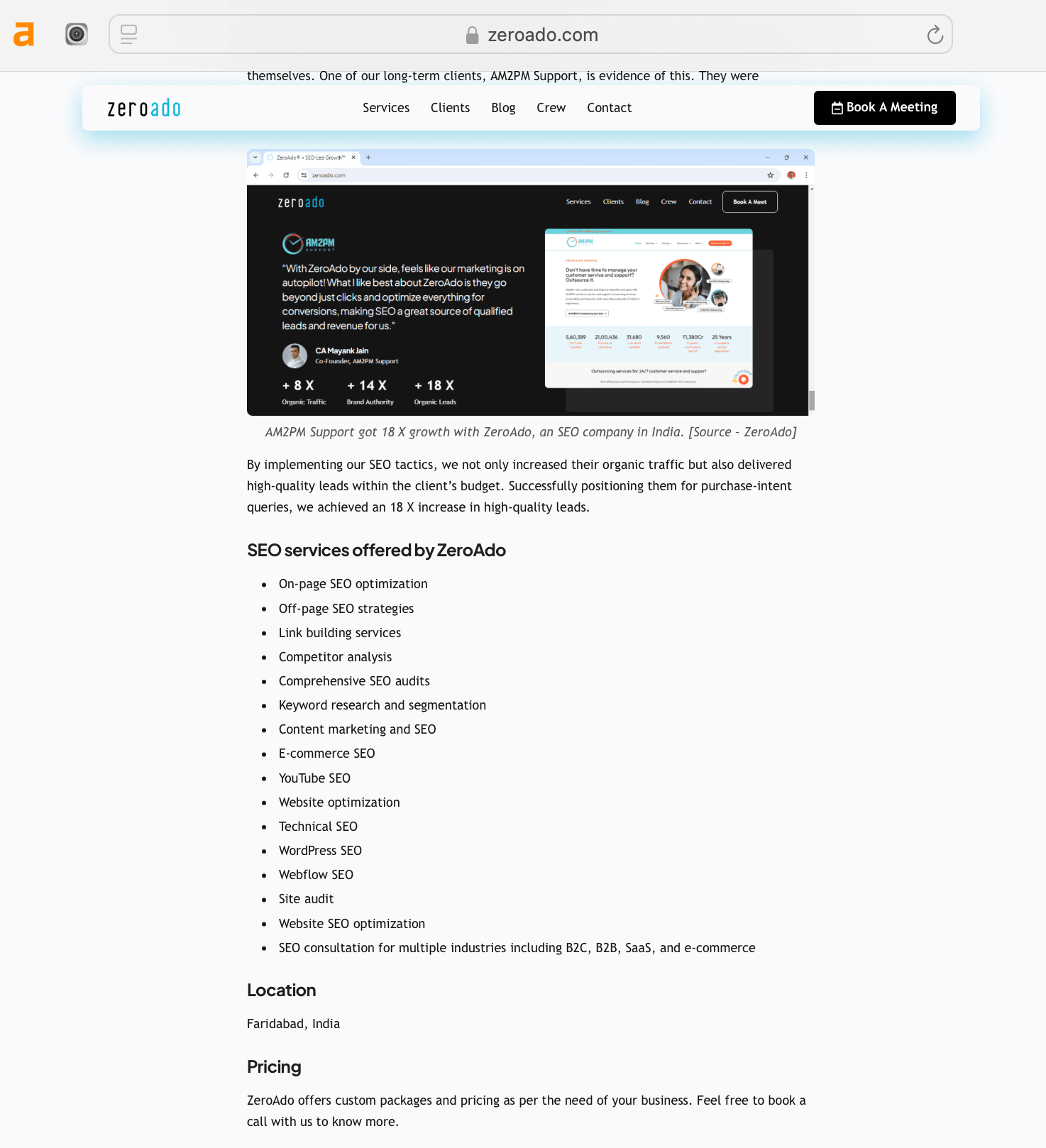
Website A: Offers a comprehensive list of reputable SEO companies in India, complete with detailed introductions, services offered, and their locations. The website is maintained by an SEO expert with extensive experience in digital marketing. The author has a strong online presence and is well-known for their expertise in the field.
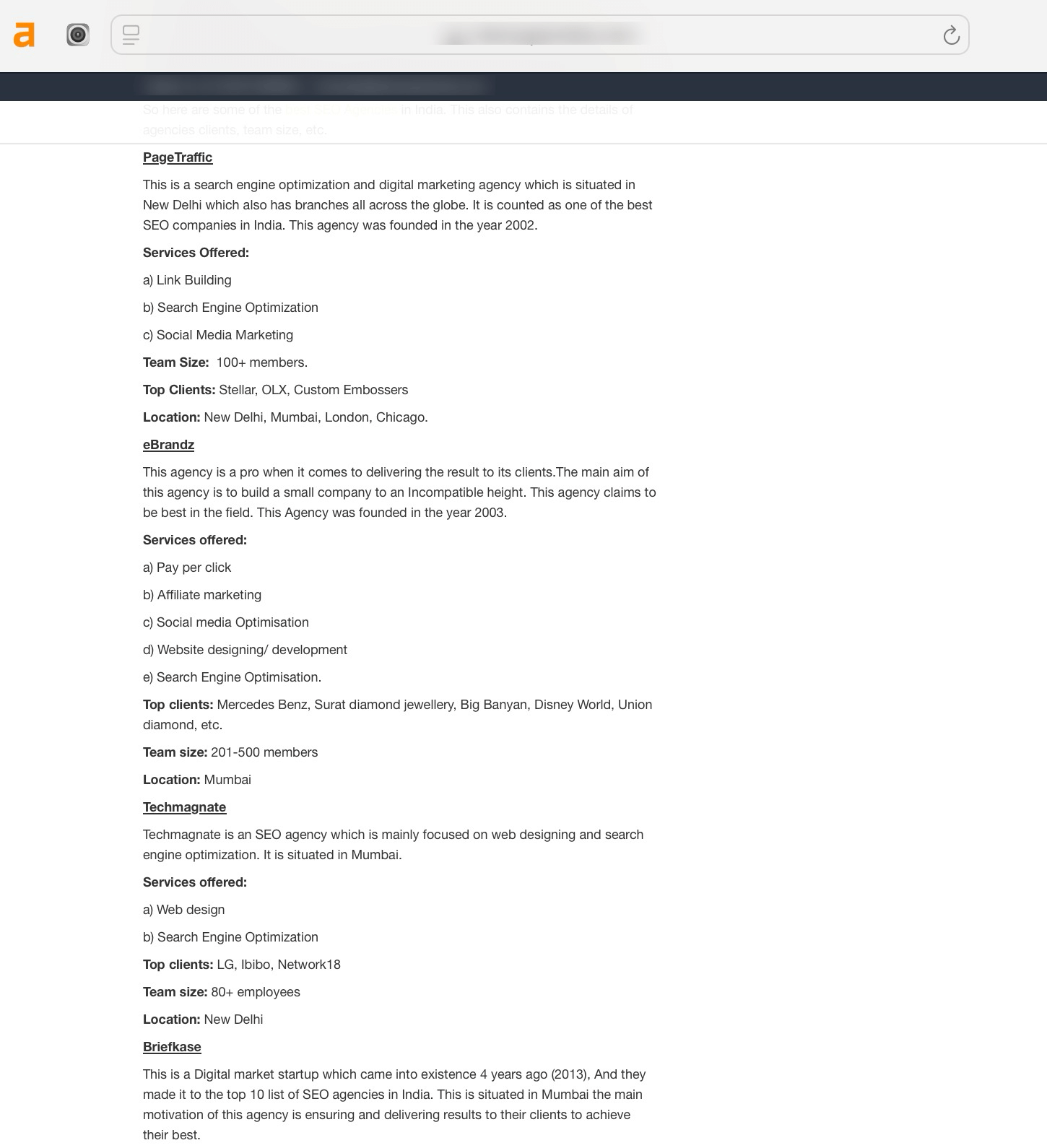
Website B: Provides a list of SEO companies but includes poorly formatted and thin content. The information lacks clear structure and additional insights. There is no image of the SEO agencies, no information about the author or their qualifications.
Let’s analyze it based on EEAT and HCU.
EEAT: Website A demonstrates strong EEAT (Expertise, Authoritativeness, and Trustworthiness). The author is a professional with a solid background in digital marketing, and the website has a well-established reputation. In contrast, Website B lacks EEAT, as there is no information about the author’s qualifications, and the content appears to be thin.
HCU: Website A aligns with HCU (Helpful Content Update) guidelines. The content is original, informative, and provides value to users. Website B may be penalized by HCU, as its content is likely thin and does not offer significant value to users.
In short, Website A is more likely to rank higher in search results due to its strong EEAT and adherence to HCU guidelines. The website offers high-quality, original content relevant to the user’s query and provides a valuable experience. On the other hand, Website B is likely to rank lower due to its lack of EEAT and potential violation of HCU guidelines.
Backlinks
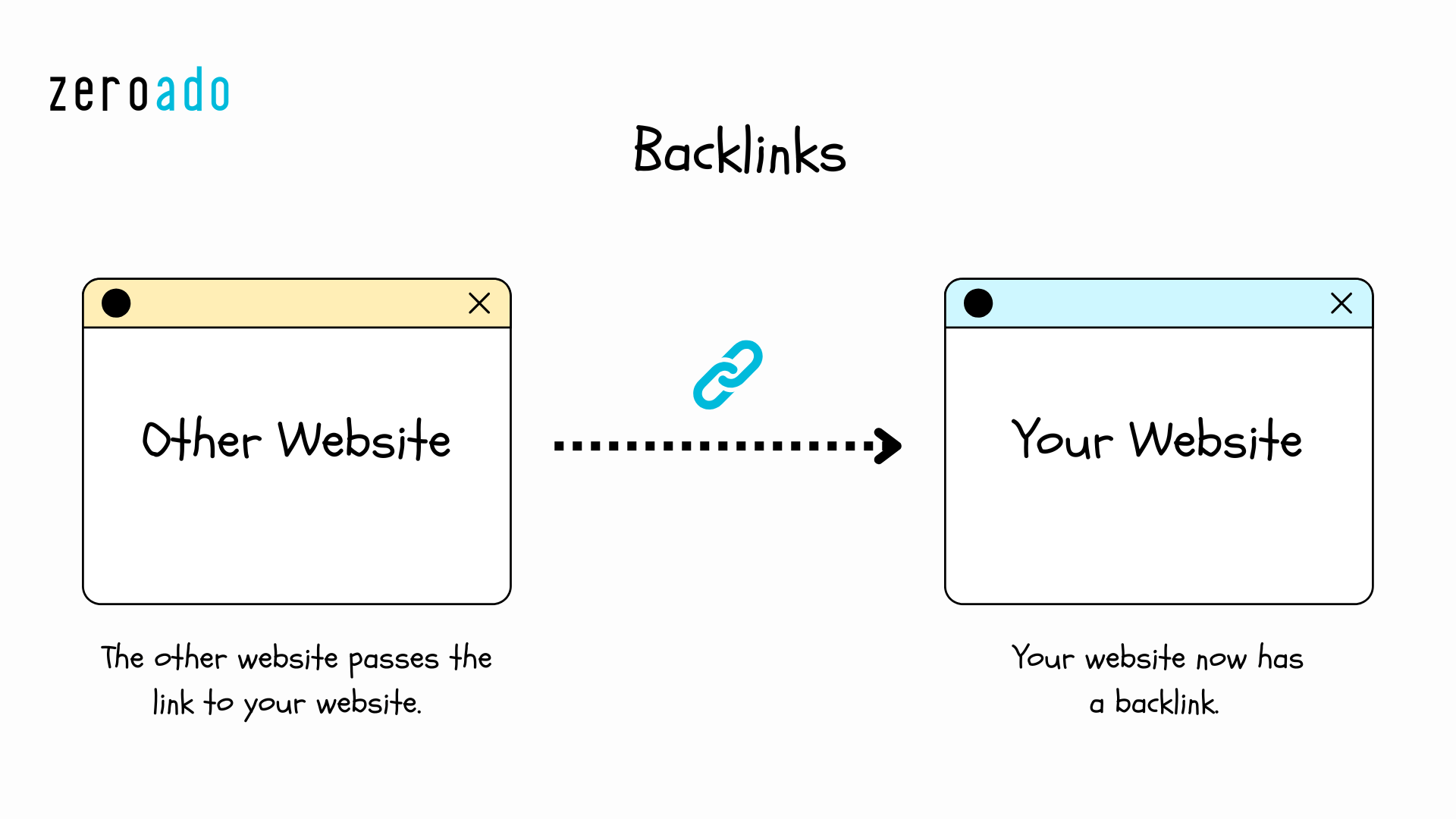
Backlinks are links from other websites that point to your content. They are crucial for SEO because they serve as endorsements, indicating to search engines that your content is valuable and trustworthy. They contribute significantly to your website’s authority and search rankings, driving organic traffic and improving visibility.
However, if you’re thinking that you can build as many backlinks as you want. Yupp! Go ahead. But remember not all backlinks are beneficial. Google penalizes websites that engage in spammy or manipulative link-building practices. Spammy backlinks, often originating from low-quality or irrelevant sites, can signal to Google that your site lacks credibility, potentially leading to a drop in rankings.
Additionally, links from Private Blog Networks (PBNs), which are created solely to manipulate rankings, can result in severe penalties, including de-indexing your website from search results. To build quality backlinks without facing penalties, focus on creating high-quality content that others will want to link to. You can also reach out to other websites and write guest posts.
You can also check your backlink profile regularly to find and remove any bad links. This way, your backlink strategy will help you reach your SEO goals.
Content and optimization trends
Creating and publishing high-quality content is one of the most important and timeless SEO trends. After all, every piece of content on the internet is created for humans and needs to resonate with them. If users find what they are looking for and your content meets their needs, congratulations, your content is user-friendly!
Now, the next step is to optimize your content for search engines, ensuring it ranks well.
In this section, we’ll cover key trends in content optimization starting from.
Voice search optimization
With the rise of voice assistants like Siri, Alexa, and Google Assistant, optimizing for voice search has become crucial. Voice search queries tend to be more conversational and longer than traditional typed queries, so you need to adapt your content to this new trend.
To optimize for voice search:
- Use natural language: Write your content in a conversational tone that matches how people speak, focusing on answering common questions.
- Focus on long-tail keywords: Since voice searches are often longer, optimize for phrases rather than single keywords. For example, instead of targeting “weather,” use “What’s the weather like in New York today?”
- Answer questions directly: Voice assistants typically read out short, direct answers from the content. Create FAQ sections or provide concise answers to specific questions in your content.
- Optimize for local search: Many voice search queries are local, such as “restaurants near me.” Ensure your business information is up-to-date and optimized for local SEO.
Video SEO
Video content is rapidly becoming a dominant form of media consumption, and optimizing your videos for search engines can increase your visibility and benefit your SEO greatly. Video SEO involves optimizing the metadata, content, and promotion of your videos to help them rank in both search engines and platforms like YouTube.
To optimize for Video SEO:
- Use descriptive titles and tags: Ensure your video titles, descriptions, and tags are relevant, concise, and include targeted keywords. This helps search engines and users understand what your video is about.
- Include transcripts: Transcribing your video content provides search engines with text to crawl, increasing the chances of ranking for relevant keywords.
- Add engaging thumbnails: An attractive thumbnail can increase click-through rates, which indirectly influences SEO. Choose an eye-catching image that represents your video content well.
- Optimize video load times: Slow-loading videos can harm user experience, so make sure your videos are compressed for faster loading without losing quality.
- Promote your videos: Share your videos across social media and embed them on your website to boost visibility and drive more traffic to them.
Schema markup
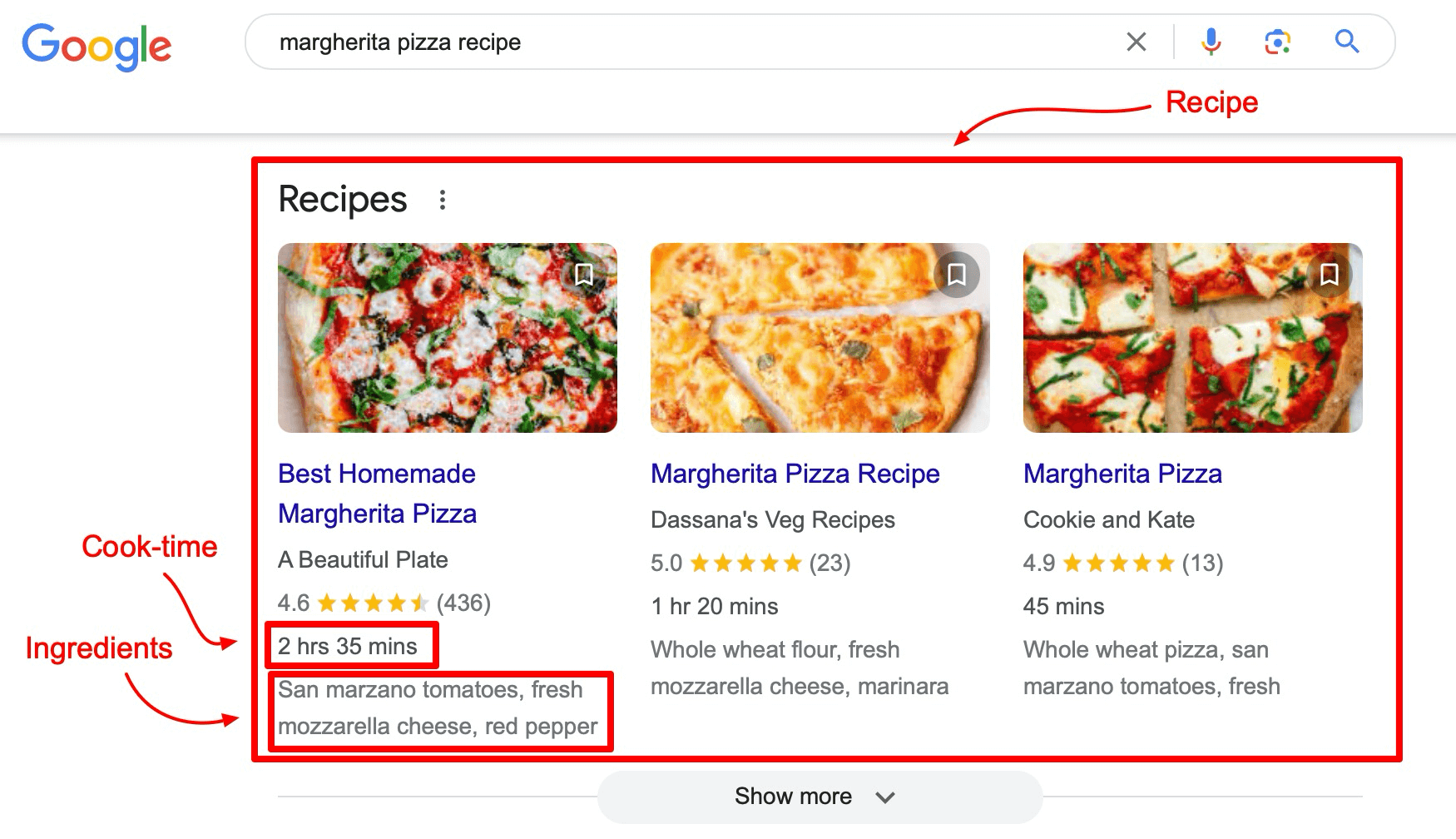
Schema markup (or structured data) is a type of code that helps search engines understand your content better and display it in a more visually appealing way in search results. This is what powers rich snippets, which can include elements like star ratings, product information, event details, and more.
Benefits of using schema markup:
- Enhanced search visibility: Rich snippets make your content stand out in search results, increasing the likelihood of getting clicks.
- Better context for search engines: Schema helps search engines interpret the context of your content, such as whether a review is for a product or a service.
- Support for various types of content: Schema can be used for a wide variety of SEO content types, including articles, reviews, products, events, recipes, and more.
- Improved user experience: By displaying additional information directly in search results, schema markup helps users find the information they need faster.
To implement schema markup:
- Identify the type of content you’re optimizing (e.g., products, reviews, articles).
- Use schema generators or manually add schema markup to your HTML.
- Test your structured data with Google’s Rich Results Test tool to ensure it’s implemented correctly.
Evergreen SEO Principles
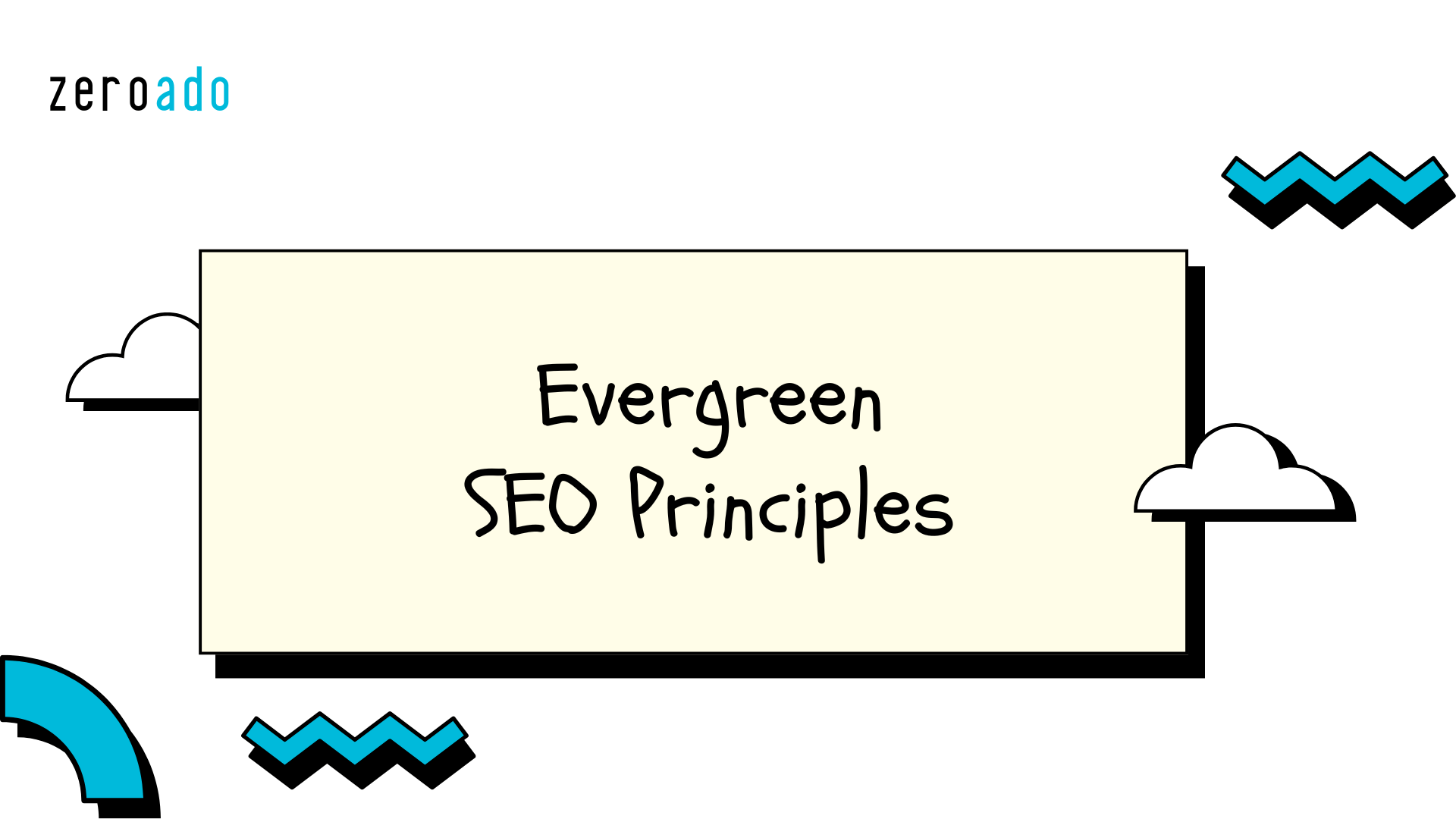
Evergreen SEO refers to optimization practices that remain effective over time, regardless of the latest algorithm updates or trends. These principles focus on creating sustainable, long-lasting SEO strategies that consistently drive traffic.
Some evergreen SEO practices are:
- High-quality content: Always prioritize creating in-depth, informative, and valuable content that serves the needs of your audience. Search engines and users alike appreciate well-researched, relevant content that stays useful over time.
- On-page SEO: Ensure your on-page elements like title tags, meta descriptions, headers, and internal linking are optimized. These basic SEO factors help search engines understand and rank your content.
- User experience: A positive user experience, including fast load times, mobile-friendliness, and easy navigation, is always important. Search engines reward websites that provide good experiences for users.
- Building quality backlinks: Backlinks from reputable websites help boost your page authority as well as domain authority and ranking potential. Focus on earning natural backlinks through great content and outreach efforts.
- Keyword research: Continually updating your keyword strategy ensures that your content stays aligned with what people are searching for. Using a mix of short-tail and long-tail keywords can capture a wide audience.
Let’s discuss a few more trends along with its impact.
Zero-click searches will continue to rise
With Google increasingly answering questions directly on its search results page, the rise of zero-click searches is inevitable. A zero-click search occurs when users get the information they need directly from the search engine results page (SERP) without clicking through to any website. This is often seen with featured snippets, knowledge panels, and instant answers, where Google pulls concise information from various sources to display at the top of the page.
To adapt to this trend, focus on creating content that has the potential to be displayed in these featured snippets and other rich results. This means structuring your content in a way that is easy for Google to understand and extract for display. For instance:
- Answer questions directly: Place the most relevant answer near the top of your content and write catchy and clear headlines to make it easy for search engines to identify.
- Use lists, bullet points, and tables: These formats are often used in featured snippets and help search engines showcase your content in a clean and structured manner.
- Target long-tail keywords and questions: Since users often phrase their searches as questions, tailoring your content to answer those questions increases the chances of being featured in snippets.
Even though more informational content may see fewer clicks due to this zero-click trend, it’s important to remember that your potential leads won’t be significantly affected. Why? Because users still need to visit your site to take action on purchasing products or services.
While Google can answer factual questions, it can’t facilitate transactions or deliver the complete value of your services. Users will still have to click through to your site to engage with your business, complete transactions, or access more in-depth resources.
This means your focus should remain on offering value through your content, whether it’s by:
- Providing detailed product information.
- Offering service explanations.
- Creating comprehensive guides that go beyond the quick answers displayed in zero-click searches.
By capturing attention at the top of the SERP and ensuring users recognize your brand as a valuable resource, you can benefit from both zero-click searches and traditional click-throughs.
Chatbots may take our fair share of traffic
I believe chatbots are the next big feature in the future of AI in marketing. As chatbots become more advanced, there’s a growing shift in how users interact with search engines. Search is gradually evolving into a conversational experience, where users expect instant, personalized answers rather than a list of links.
This change is being driven by AI-powered chatbots and virtual assistants like Google Assistant, Siri, and Alexa, which provide responses directly from search engines or their own knowledge databases. As a result, search is becoming more like a conversation rather than a traditional search engine query process.
Search becoming conversational
Instead of typing keywords and getting a list of links to click, people are starting to have conversations with search engines. This means they ask complete questions, and chatbots or virtual assistants like Google Assistant, Siri, and Alexa provide direct answers without users needing to visit a website.
This has led to a reduction in the number of traditional search clicks, as users get their answers without visiting a website.
For example, rather than searching for short keywords like “best restaurants in New York,” users might simply ask, “Where’s the best Italian restaurant near me?” The chatbot or AI instantly gives them an answer, often without the need for them to scroll through multiple search results. This change in how people search is making traditional browsing less common.
From search engine to answer engine
Search engines are also evolving into answer engines, meaning they aim to give users direct answers on the search results page itself, instead of just showing links.
Google is now displaying more featured snippets and AI-generated overviews at the top of the search results. This helps users get quick answers, but it can reduce the number of clicks to websites since users don’t need to visit a page for simple information.
With chatbots and answer engines becoming more common, websites might lose some traffic, as people are getting their answers directly from search results. However, this doesn’t mean you’re out of the game. While simple informational content may get fewer clicks, users still need to visit your site to make purchases, book services, or find more in-depth information.
To overcome this SEO trends at some extent you can follow the below practices
- Create a copywriting checklist to ensure your content meets SEO best practices
- Structure your content so it can be easily displayed in Google’s featured snippets or chatbot answers.
- Write in a natural, question-and-answer style, making it easy for AI tools to pull relevant answers.
- Provide deeper value because while simple questions might be answered by chatbots, users will still visit your site for more detailed information, transactions, or specialized services.
Will all these SEO trends gonna drag your traffic down?
It’s understandable to worry that the latest SEO trends might hurt your traffic, especially with the rise of AI, chatbots, and zero-click searches. Yes, there may be a slight dip in traffic for informational content because users can now get quick answers directly from search results without clicking through to a website.
But if your website focuses on products or services, you’re more likely to see traffic go up, not down. Why? Because people still need to visit your site to make purchases, book services, or dive deeper into more complex topics.
Another thing is, if you’re following white hat SEO practices, meaning you focus on high-quality, relevant content, earning natural white hat backlinks, and providing a great user experience, you’re in a good position. Google’s core updates are designed to reward websites that offer value and follow ethical practices.
The fear surrounding core updates really only applies to those who are using black hat techniques (like keyword stuffing or spammy backlinks). For ethical sites, Google updates are more of an opportunity to improve your rankings, as they’re geared toward giving users the best, most relevant content.
Stay ahead and follow the latest SEO trends
We’re all worried about the future of SEO with so many changes—AI, zero-click searches, and Google updates. But don’t worry! If you’re following white hat SEO and focusing on user experience, these trends are actually opportunities, not threats.
Embrace the changes by staying updated, optimizing for voice and video search, and focusing on quality content. To stay ahead in this evolving SEO landscape, consider partnering with ZeroAdo, a leading B2B SEO company that helps you navigate the latest trends and keep your site optimized for top performance.

